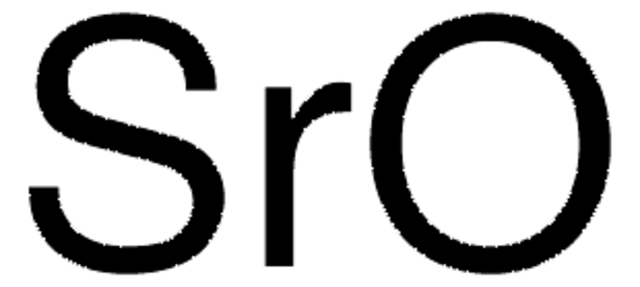517011
Strontium titanate
nanopowder, <100 nm particle size, 99% trace metals basis
Sinónimos:
Strontium metatitanate, Strontium titanium trioxide
About This Item
Productos recomendados
Quality Level
assay
99% trace metals basis
form
nanopowder
dielectric constant
300
reaction suitability
reagent type: catalyst
core: titanium
particle size
<100 nm
mp
2060 °C (lit.)
density
4.81 g/mL at 25 °C (lit.)
SMILES string
[Sr++].[O-][Ti]([O-])=O
InChI
1S/3O.Sr.Ti/q;2*-1;+2;
InChI key
VEALVRVVWBQVSL-UHFFFAOYSA-N
¿Está buscando productos similares? Visita Guía de comparación de productos
General description
Application
- Photoinduced electronic and ionic effects in strontium titanate: Focuses on the interaction of strontium titanate with ultraviolet radiation, investigating photoionic processes and photochromic effects, which are crucial for developing optoelectronic devices (M Siebenhofer et al., 2021).
- The emerging career of strontium titanates in photocatalytic applications: Reviews the role of strontium titanates in photocatalytic applications, particularly emphasizing their utility in environmental remediation processes (N Sharma, K Hernadi, 2022).
- Recent advances on carrier and exciton self-trapping in strontium titanate: Discusses the self-trapping of carriers and excitons in strontium titanate, providing insights into its electronic properties and implications for semiconductor technologies (ML Crespillo et al., 2019).
Storage Class
11 - Combustible Solids
wgk_germany
WGK 3
flash_point_f
Not applicable
flash_point_c
Not applicable
ppe
Eyeshields, Gloves, type N95 (US)
Elija entre una de las versiones más recientes:
¿Ya tiene este producto?
Encuentre la documentación para los productos que ha comprado recientemente en la Biblioteca de documentos.
Los clientes también vieron
Artículos
Synthesis, Properties, and Applications of Perovskite-Phase Metal Oxide Nanostructures
Nuestro equipo de científicos tiene experiencia en todas las áreas de investigación: Ciencias de la vida, Ciencia de los materiales, Síntesis química, Cromatografía, Analítica y muchas otras.
Póngase en contacto con el Servicio técnico






